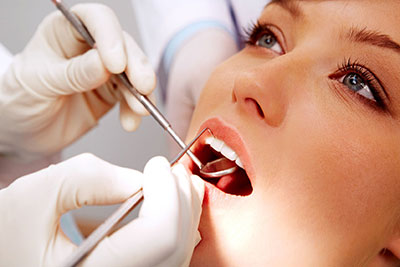Oral Cancer Screening
Diagnosing oral cancer at an early stage is crucial to treating it immediately. Some ways that your dentist can screen for presence of abnormal cells in your mouth if you are at a moderate to high risk of cancer include:
Toluidine blue rinses: this is a blue colored dye that you are asked to rinse with during an oral cancer screening by your dentist. Abnormal cells in the mouth, if present, absorb the Toluidine blue dye while normal cells do not, indicating their presence in the mouth. This method is not diagnostic for cancer and simply directs the dentist as to where further diagnostic testing such as biopsy is needed.
Fluorescent light: A blue light is shone over the soft tissue in the mouth and healthy tissue glows a fluorescent bright green while abnormal tissue appears black or brown. Other lights may show healthy tissue as black while abnormal tissue appears white. In either case, this too is not a diagnostic measure and biopsy of any suspected area should be carried out.
People who are over the age of 45 are most at risk for oral cancer. Oral cancer results from abnormal cell growth in the lips, tongue, mouth or throat. Regular screening from your dentist can help detect early signs of oral cancer, inform you of the risks and can educate you on preventive measures.
Signs and symptoms of Oral Cancer
- Dark red or white patches located in your mouth, or on your tongue or on your lips.
- Change in the color of the soft tissue inside your mouth.
- Open sores inside your mouth that don’t heal.
- Problems or difficulty swallowing.
- Change in taste or change in tongue sensation.
Risk factors
You are more at risk of oral cancer if you do the following:
- Use or Smoke tobacco products ( cigarettes, cigars, chewing tobacco etc).
- Use alcohol excessively.
- Prolonged exposure of the lips from the sun.
- If you are a certain gender ( men develop the disease more so than women).
Diagnosis and treatment
If oral cancer is suspected:
- A biopsy of the suspicious area may be taken and examined under a microscope.
- Surgery
- Chemotherapy or radiation therapy may be used to remove the tumor.
Helping to prevent oral cancer
- Ask your dentist about oral cancer screenings.
- Stop using tobacco products.
- Limit harmful U/V rays on your lips by using U/V protective lip balms.
- Eat a balanced diet that contains fruits and vegetables.
- If you notice signs or symptoms of oral cancer report them to your dentist right away.






